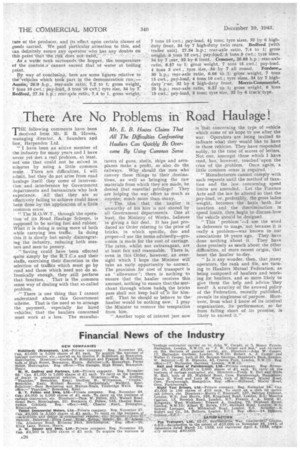There Are• No Problems in Road Haulage!
Page 28

If you've noticed an error in this article please click here to report it so we can fix it.
Mr. E. B. Honks Claims That All The .Difficulties Confronting Hauliers Can Quickly Be Overcome By Using Common Sense ,THE following comments have been received from Mr. E B. Howes, managing director, A. Saunders and Son, Harpenden Ltd.
." I have been an active member of the industry for many years aud I have never yet met a real problem, at least, not one that could not be solved in minutes by using a little common senie. There are difficulties, I will admit, but they.do.not arise from road haulage itself: they come of intervention and interference by Government departments and bureaucrats who lack experience. 'All that they are so effectively failing to achieve c•ould have been done by the application of a little common sense.
"The M.O.W.T., through the operation of its Road Haulage Scheme, is supposed to be saving fuel and rubber. What it is doing is using more of both while carrying less traffic. In doing this it is slowly but surely disintegrating the industry, reducing berth masters and mento penury.
" Saving could have been effected quite simply by the R.T.C.s and their staffs, exercising their discretion in the selection of traffics which must go by road and those which need not do so. Ironically enough, they still perform that function. That is the common sense way of dealing with that so-called problem.
" There is one thing that I cannot understand about this Government scheme. That is the need so to arrange the payment, especially for hired vehicles, that the hauliers concerned muSt work at a loss, The manufac
turers of guns, shells, ships and aeroplanes make a profit, so also do the railways. Why, should the men who convey these things to their .destinations, as well as bringing the raw materials from which they are made, be denied that essential privilege? They are helping the war effort as much as anyone; much more than many.
" The idea that the haulier is unworthy of his hire is not shared by all Government departments.One at least, the Ministry of Works, believes in giving a fair deal. It has just produced an Order relating to the price of bricks, in which specific, due and proper—I use the terms advisedly—provision is made for the cost of carriage. The rates, whilst not extravagant, are at least fair and reasonable. There is, even in this Order, however, an oversight which I hope the Minister will take an early opportunity to correct. The provision for cost of transport is an ' allowance"; there is nothing to ensure that the haulier receives this amount, nothingto ensure that the merchant through whose handLthe bricks pass shall not keep half of for himself. That he should so behave to the haulier would be nothing new. I pray the Minister to remove the temptation from him.
" Another topic of interest just now
is .thdt concernine° the type of vehicle which some of us hope to use after the war. Operators are being invited to indicate what they would like to have in those vehicles. They -have responded nobly, to the tune of scores of letters. Not one, amongst those which I have read, has, however, touched 'upon the crux .of the problem. Once again, a little common -sense is required.
" Manufacturers cannot comply with such requests until the method of taxation and the law concerning speed limits are amended. Let the Finance Acts and the law be altered so that the pay-load, or, preferably, the gross laden weight, becomes the basis both for taxation and the discrimination in speed limits, then begin to discuss-how the vehicle should be designed.
"This ' problem '—I use the word in deference to usage, not because it is really a problem—was known to . our associations 10 years ago. They have done nothing about it. They have done precisely as much about the other difficulties, of more recent origin, that beset the haulier to-day.
" Is it any wonder, then, that ,,many operators, the rank and file, are turning to Hauliers Mutual Federation, as being composed of hauliers and work.; lug for hauliers, and so more likely to give them the help and advice they need! A scrutiny of the avowed policy of the Federation, recently published, reveals its singleness of purpose. MoreOver, from what I know-of its internal organization, its performance, so far from falling short of its proMise, is likely to exceed it."




















































